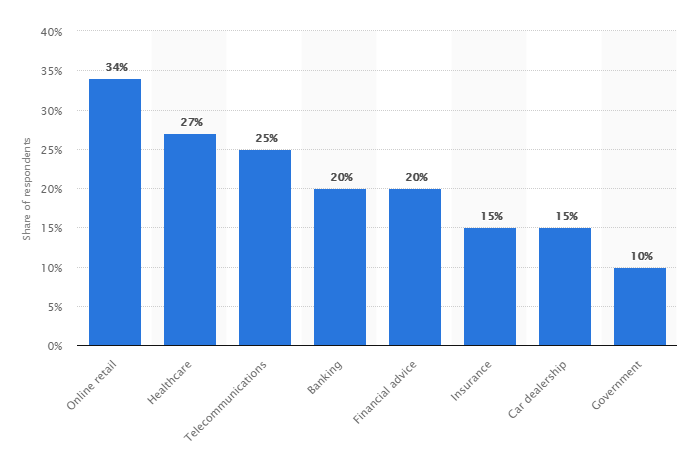We all did this; we all regretted. There’s a cast-iron rule we all tend to break — if you feel unwell, don’t search for your symptoms online. On the other hand, you can’t just book an appointment whenever an occasional headache, itch, or numbness in limbs hits.
Healthcare chatbots are a happy middle ground for those who want to ask about their health — without asking the internet and getting a list of terminal diagnoses.
Being relatives of Siri and Google Assistant on one side and kindred of remote patient solutions or RPM on the other, these AI-powered bots can bring peace of mind to both care providers and consumers by giving individuals medically correct suggestions on particular health concerns.
However, despite massive investments, healthcare chatbots aren’t a thing yet. According to 2017 worldwide Statista questioning, only 27 percent of respondents preferred to chat with a bot instead of a human regarding their health needs.
So, what stops the world from embracing healthcare chatbots? I’ve picked the three most money-drawing projects to find their hots and nots and decide whether the current AI is ready to save us from googling symptoms:
- Babylon ($85M)
- Ada ($69.3M)
- Your.MD ($17.3M)
Babylon | $85M
https://www.youtube.com/watch?v=CMD6B8h6Pzg
Health tracking. The app allows users to track medical history, medications, nutrition, activity, weight, sleep, pulse, blood pressure, and stress levels using smart medical devices or to report them manually. Babylon also offers users to order test kits or add manual data to track key health metrics.
Follow-ups. Every day, the bot asks the user about previously entered symptoms and the overall wellbeing.
Where the Babylon chatbot is not so great:
More explanation is needed. Even though the questionnaire feels like a dialogue, additional clarity is needed. For example, some illustrations to explain symptoms and help a person make the right choice. Stating the main guess and offering other options to look at can be a nice touch too.
Lacking a history of symptoms. While Babylon stores previous chats, there’s no way to access previously reported symptoms. I person needs the choice of whether to save the search or not. It may be essential to have the information you looked up during a follow-up doctor appointment.
Gap between the bot and health tracking options. Since the app offers many health tracking options to report, the bot should be able to ask the user enter their daily data. This approach can make this experience more engaging and recurrent, allowing the user to access health patterns more accurately.
Conclusion for the Babylon Chatbot.
Overall, Babylon chatbot creates a pleasant chat experience with beneficial outcomes. It offers follow-ups and allows for self-tracking of various vitals. At the same time, it lacks differential diagnosis options, clarifying illustrations, and connectivity with the rest of the app. Still, if a possible condition is worrying the user, they can book a remote appointment with a health specialist right away. To get help quickly is a significant advantage.
Ada | $69.3M
Sophisticated NLP. Ada uses NLP in a more exciting way than Babylon. It lets a user start typing a symptom, and then outputs possible similar options to specify the source of discomfort, e.g., headache location — eye area, temples, back of the head and more. This hinting helps the bot grasp the concern right away, increasing the chance of valuable output.
It’s alive! Ada is compatible with Alexa speaker, enabling the users to communicate with the bot orally.
Differential diagnosis. While asking questions, Ada separates the main symptom from additional issues. This ranging creates a differential diagnosis, meaning that the bot will later offer a few possible conditions with different probability chances. It is an incredibly complex algorithm, currently used in clinical decision support systems.
Explains-it-all. The bot offers explanations for each question to avoid random answers, sometimes supporting the query with a picture, e.g., for discomfort localization.
Step-by-step guidance. After the user has completed the questionnaire, Ada offers next steps (emergency care, appointment, painkillers, etc.) and shows a clear and concise report describing possible conditions with details on lab tests and treatment. Besides, it lists reported symptoms and calculates the condition’s likelihood. This list can be then shown to a physician during an appointment.
Follow-ups. Ada also offers follow-ups, but in a more detailed way than Babylon. The bot asks whether the user visited a doctor and if yes, asks if the main condition guess was confirmed. If not, the algorithm analyzes the right answer to learn more and improve itself.
Where the Ada chatbot is not so great:
Scarce health tracking. Though Ada tracks health status, it focuses on mental health, e.g., sleep issues, social anxiety, depressed mood, and avoidance behavior. If the user reports any of mental health issues, the app starts asking about these symptoms daily to build a pattern. This is useful, but how about temperature, blood pressure or sugar levels at least?
Conclusion for the Ada Chatbot.
Ada is a strong example of an advanced healthcare chatbot, conducting differential diagnosis, supporting voice control via smart speaker and navigating towards needed medical assistance comprehensively. To make Ada even better at helping its users, developers should improve health tracking options.
Your.MD | $17.3M
Leveled-up interaction choices. Your.MD’s user can start chatting with the bot via symptom checker, health info section, or two free-text fields. Yes, AI can grasp symptoms from all of these.
All at once. The bot offers to pick a few symptoms simultaneously, streamlining the conversation. Fewer questions, faster analysis.
Good consultation report. Upon completing the assessment, the user gets a report with entered symptoms, possible conditions, and next steps. There’s also a remarkable tip on when to worry and seek for emergency care.
Quizzes and self-assessments. There’s so much you can do with the bot, starting from passing mental health and sleep assessments to finding a well-fitting birth control method for women. Engaging and interactive content is Your.MD’s forte for sure.
Various ways to help. If you ask Your.MD about an organ instead of a symptom, the bot will output a few articles on the query.
Where the YourMD chatbot is not so great:
Health tracking? Nope. The app doesn’t allow for it. The user can only enter mood, weight, sleep, or steps. The bot lacks real health status metrics to understand patterns in symptoms and physical changes.
No alternative conditions. Sadly, Your.MD supports only one diagnosis suggestion at a time.
Conclusion for the Your.MD Chatbot.
Your.MD’s AI is rather complicated and quick to come up with a possible diagnosis, but it offers no decent health tracking functionality. On the positive side, the bot is stuffed with engagement techniques and even introduces therapeutic education.
AI is ready; what about us?
As we can see, the only issue with the chatbots reviewed is their disconnection from a person’s overall health profile. However, this gap shouldn’t affect adoption rate so much, because the global chatbot market is on the rise — for instance, Grand View Research expects the area to reach $1.25B by 2025, growing at 24.3% CAGR.
With this in mind, we can conclude that healthcare software development and healthcare chatbots are here to stay and wait a bit for their users to come. We’ll need some time to break the awful habit of googling for symptoms, but we’ll get there very soon.



















